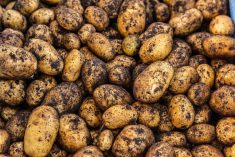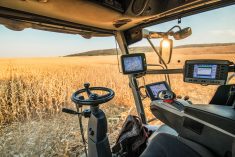North America’s pork producers have issued a dire warning about a looming continental feed grain shortage that may jeopardize meat supplies and animal welfare in the coming year.
Leaders of the Canadian Pork Council, the U.S. National Pork Producers Council and the Confederacion de Porcicultores Mexicanos last week issued an urgent call for government action to ensure adequate livestock feed supplies this coming year.
“If the availability of feed is not addressed in a responsible way, the ability of hundreds of millions of people to consume pork and other meat and poultry products will be jeopardized,” the three producer groups said in a March 14 joint statement following a regular semi-annual meeting in Merida, Mexico.
Read Also

Mazergroup’s Bob Mazer dies
Mazergroup’s Bob Mazer, who helped grow his family’s company into a string of farm equipment dealerships and the main dealer for New Holland machinery in Saskatchewan and Manitoba, died July 6 from cancer.
Jurgen Preugschas, CPC president, insisted later producers are not being alarmist and the threat is real.
“There’s a real fear of suddenly running out of feed (and) not having the ability to feed our animals,” he said.
Preugschas referred to a recent U.S. Department of Agriculture report predicting the year-end American corn reserves could be about half of normal.
Weather problems this coming year could weaken the availability of livestock feed even more, he said.
“If there’s any climate disaster in North America, we’ve got a big problem.”
As an example, Preugschas pointed to Mexico, where recent frosts affected hundreds of thousands of acres of light corn used for making tortillas, a Mexican staple food. He said the industry will have to use yellow corn to compensate, shorting the livestock feed market.
Preugschas said feed supplies may be adequate this year but shortages could occur before the end of the next crop year.
“What will that do? It will mean we either have to slaughter all our animals long before they’re ready or reduce production,” he said. “If there’s no feed, it’s immediate rationalization.”
Preugschas blamed the North American ethanol industry for siphoning off feed grain to make fuel for cars instead of feeding humans and livestock.
Roughly half the U.S. corn acreage this year will go to producing ethanol for gasoline blends as mandated by American federal legislation.
The demand for corn to make ethanol on top
of already tight supplies is driving producers’ feed costs through the roof, said Preugschas.
He said the cost of hog finisher ration on his own farm near Mayerthorpe, Alberta rose from $206.40 a tonne last August to $253.80 a tonne this month – a 23 per cent increase in seven months.
Preugschas said producers in all three countries want their respective governments to develop fallback plans to ensure people and animals get priority if grain shortages occur.
He acknowledged Western Canada is not short of feed right now, despite widespread flooding last summer which reduced crop yields.
But one thing leads to another and a shortage in one region will inevitably mean shortages in other areas, he said.
While Canada is not in dire straits yet, the situation appears serious in the U.S. and Mexico, judging by last week’s meeting, said Preugschas.
“I’m very calm compared to what the Americans and the Mexicans were saying,” he said. “They’re really, really worried.” [email protected]
———
“Ifthere’snofeed,it’simmediaterationalization.”
– JURGEN PREUGSCHAS, CPC


















